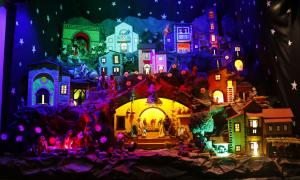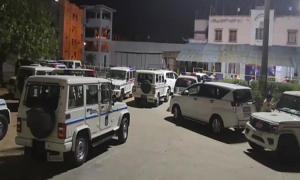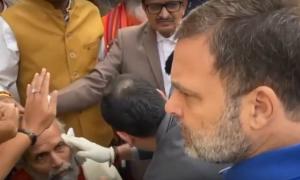 Saudi Arabia's King Fahd, who died today, sought to modernise his desert kingdom while balancing change against tribal tradition and orthodox Islam, but a stroke a decade ago left him a ruler in name only during tumultuous times for the world's biggest oil producer.
Saudi Arabia's King Fahd, who died today, sought to modernise his desert kingdom while balancing change against tribal tradition and orthodox Islam, but a stroke a decade ago left him a ruler in name only during tumultuous times for the world's biggest oil producer.
His death comes as the Saudi government pursues an aggressive clampdown on Islamic terrorism and unprecedented reforms.
The portly, goateed Fahd inadvertently helped fuel the rise of Islamic extremism by making concessions to hard-liners in an effort to boost his Islamic credentials. But he also brought the kingdom closer to the United States and agreed to a step that enraged many conservatives: the basing of US troops on Saudi soil after the 1990 Iraqi invasion of Kuwait.
In his last years, the sickly Fahd was mostly a figurehead as the close relationship he nurtured with the United States deteriorated after the September 11 terror attacks. Fifteen of the 19 hijackers were Saudis, and many in the US administration blamed the kingdom's strict Wahhabi school of Islam for fueling terrorism.
It fell to Fahd's half-brother, Crown Prince Abdullah, who was appointed as the new monarch today, to guide Saudi Arabia.
Abdullah, who took on that role wary of close US ties, oversaw the crackdown on religious militants after followers of
Saudi-born Osama bin Laden launched a wave of attacks in the kingdom two years ago. He also pushed a campaign against extremist teaching and preaching, and introduced the kingdom's first elections, for municipal councils, earlier this year.
Saudi Arabia and the United States have also found themselves at odds over oil. Saudi Arabia is the world's largest exporter, sitting atop a quarter of the world's known reserves, and America is the world's largest energy consumer. With prices recently topping US $ 50 a barrel, Washington has been pushing the Saudis to pump more oil and bring prices down.
King Fahd, once a stickler who took a hand in the smallest details of government activities, stayed on the sideline as the kingdom dealt with tose crises.
Visitors who saw Fahd after his 1995 stroke reported he was barely aware of what was going on around him and could not recognise those who shook hands with him. Foreign dignitaries usually were allowed brief meetings, their visits lasting only as long as it took to film footage for the state TV stations. He was usually accompanied by close family members to avoid any potential embarrassment.
On newscasts, the king was shown seated as he extended his hand to visitors or sipped coffee. Occasionally, policy
statements, comments or speeches were issued in his name, and he was shown presiding at ministerial meetings when Abdullah was out of town.
The stroke left Fahd with short-term memory loss and an inability to concentrate for long stretches. The overweight monarch got around in a wheelchair and used a cane for short walks in his later years.
Fahd, born in Riyadh in 1923, was proclaimed the fifth king of Saudi Arabia on June 13, 1982. He assumed the throne just three years after two events in 1979 that would fuel extremism in Saudi Arabia -- Ayatollah Ruhollah Khomeini founded the strictly religious Islamic Republic in Iran just across the Persian Gulf, and radical Muslims briefly took over the holy mosque in Mecca, proclaiming the Saudi royal family not Islamic enough to rule.
Those developments, coupled with Fahd's reputation as a former gambler and womaniser, made the liberal-leaning king
move toward appeasing the powerful Saudi religious establishment, including the moral police who enforce strict social codes that oblige women to wear veils and ban men and women from mingling.
Saudi Arabia did not want Shiite Iran to be seen as more Islamic than the Sunni kingdom, birthplace of Islam. So Fahd took the title 'Custodian of the two holy mosques' -- referring to Islam's holiest shrines at Mecca and Medina -- and he poured millions of dollars into the religious establishment and into enlarging fundamentalist universities.
In the 1980s, Saudi Arabia, the United States and Pakistan mobilised Muslims to fight the Soviet occupation of Afghanistan. Millions of Saudi riyals were donated to that effort and, encouraged by the government, thousands of Saudis joined the war, including bin Laden. The king's official biography described Fahd as 'an ardent supporter' of the Afghan mujahideen.
But after the Soviet withdrawal in 1989, Fahd, like the US and Pakistani leaders, gave little attention to the mujahideen, who turned Afghanistan into a training ground for their attacks, including the 9/11 suicide hijackings.
Earlier in his rule, Fahd was credited with turning Saudi Arabia into one of the Middle East's most modern states despite tribal traditions and Islamic fundamentalists' fears that the changes would dilute Muslims' faith.
In 1985, Fahd's nephew, Prince Sultan bin Salman, went into space aboard the US shuttle Discovery as the first Arab and Muslim astronaut.
When Iraqi leader Saddam Hussein invaded Kuwait in 1990, raising fears that he also might continue on into Saudi Arabia, Fahd was persuaded to let hundreds of thousands of the US and other Western soldiers, including women, into his insular, rigidly Muslim kingdom to face the Iraqis.
The move was sharply criticised by Islamic fundamentalists who oppose Western influence and spawned the first potent opposition to Fahd's rule. Demonstrations were quelled and hundreds of clerics detained. Radicals set off bombs at two military posts of the US in Saudi Arabia in 1995 and 1996, killing 25 Americans.
Bin Laden, who had earlier been stripped off his Saudi citizenship by Fahd's government, became even more determined in his opposition to the Saudi royal family.
The Kuwait crisis also cost Saudi Arabia financially. The US $ 60 billion bill, coupled with lower oil prices, forced Fahd to scale back lavish benefits that maintained citizens' loyalty -- free education, free medical treatment, free lots for homes and businesses. It was not until late 2004, amid high oil prices, that the Saudi Cabinet balanced the budget for the first time in nearly a decade.
Fahd was the son of the founder of modern Saudi Arabia, King Abdul-Aziz, and got an elementary school education with a heavy emphasis on religion at a school set up by Abdul-Aziz for his 42 sons.
He loved the good life and travelled often, enjoying years of high living. But when he was in his late 20s, he was summoned and told that to maintain his place in the succession he had to shape up.
As the country's huge oil reserves brought the once impoverished country massive wealth, Saudi Arabia's primitive tribal society underwent an abrupt transformation, often with outside help.
In 1953, Fahd became the nation's first education minister, laying the foundation for a nationwide school system that grew from 30,000 students to more than 3.2 million students today enrolled in seven universities, 83 colleges and over 18,000 schools throughout the country.
In 1962, he became interior minister and then crown prince in 1975 when King Faisal was slain by a deranged nephew. Fahd was de factor ruler during the seven-year reign of his brother Khaled, a devout and apolitical man, and assumed the throne formally at Khaled's death in 1982.
Fahd always appeared in the traditional flowing white robe and 'mishlah' -- a camel-coloured cape adorned with spun gold. He was a night-owl who slept during the day and often opened weekly ministerial meetings near midnight. His short working hours and centralised style -- he insisted on approving even minor details -- left a constant bottleneck of paperwork.
Little is known about Fahd's private life, but he is believed to have had three wives and eight sons. His eldest son, Faisal, died in 1999 of a heart attack.
Photograph: AFP/Getty Images








More from rediff